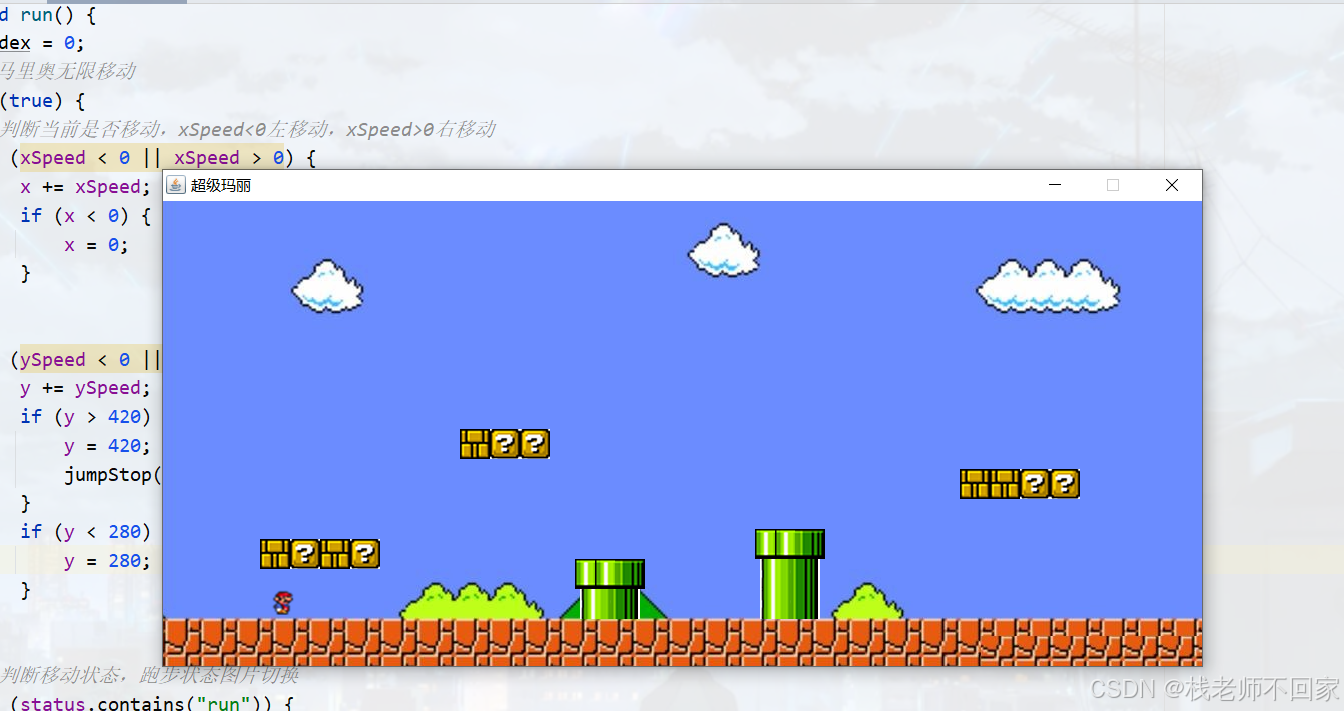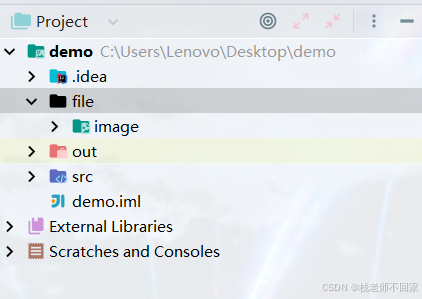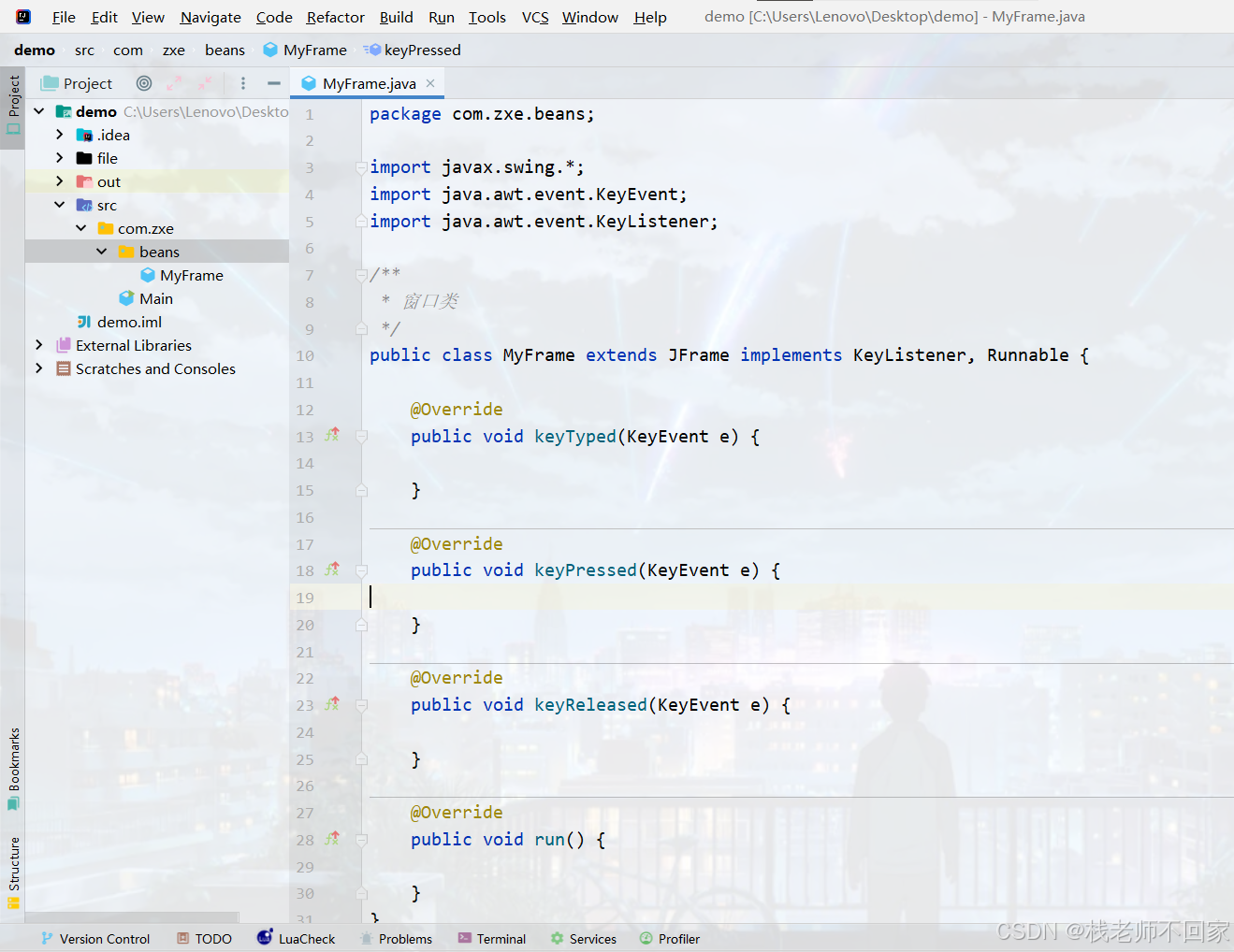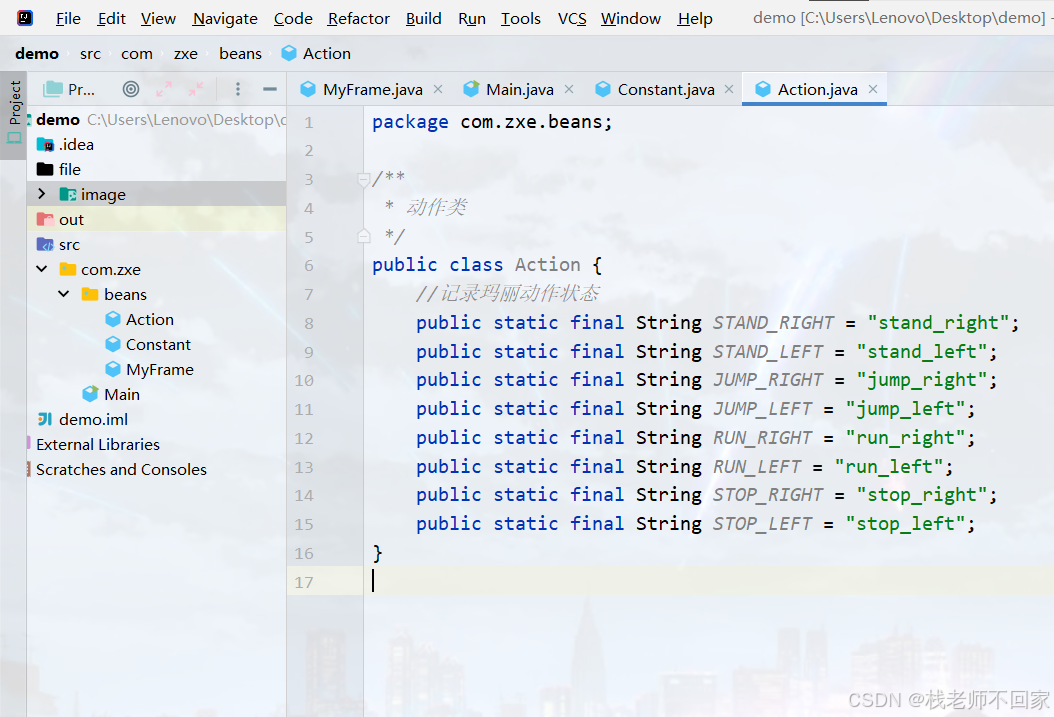一、效果展示
二、代码编写
1. 素材准备
首先创建一个基本的 java 项目,并将本游戏需要用到的图片素材 image 导入。
图片素材如下:
https://pan.baidu.com/s/1db_IcPvPKWKbVPtodPWO5Q?pwd=03kv
提取码:03kv
2. 创建窗口类
① Java 内部已经给我们封装了窗口的各种方法,我们只需创建一个窗口类并重写父类的方法,即可使用;
② Alt + Enter 键 → implement methods 可一键补全所有的重写方法;
③ 实现多线程有两种方法,分别是继承 Thread 类和实现 Runnable 接口,这里我们用 Runnable 方法,因为 Java 不支持多继承。
重写 paint 方法,实现场景、物体的绘制,使用多线程无限绘制窗口。
完整代码如下:
package com.zxe.beans;
import javax.swing.*;
import java.awt.*;
import java.awt.event.KeyEvent;
import java.awt.event.KeyListener;
import java.util.ArrayList;
import java.util.List;
/**
* 窗口类
*/
public class MyFrame extends JFrame implements KeyListener, Runnable {
//定义一个集合用于所有的关卡
private List<LevelMap> levelMaps = new ArrayList<>();
//定义一个变量,存放当前背景
private LevelMap levelMap = new LevelMap();
//定义变量,记录马里奥
private Mario mario;
//重写paint方法,实现场景、物体的绘制
@Override
public void paint(Graphics g) {
//创建一张图片
Image image = createImage(1045, 500);
//设置图片
Graphics graphics = image.getGraphics();
graphics.drawImage(levelMap.getBg(), 0, 0, 1045, 500, this);
//绘制障碍物
for (Obstacle obstacle : levelMap.getObstacles()){
graphics.drawImage(obstacle.getObstacleImage(), obstacle.getX(), obstacle.getY(), this);
}
//绘制马里奥
graphics.drawImage(mario.getMarioImage(), mario.getX(), mario.getY(), this);
//将图片描绘到当前窗口中
g.drawImage(image, 0, 0, this);
}
@Override
public void keyTyped(KeyEvent e) {
}
@Override
public void keyPressed(KeyEvent e) {
if (e.getKeyCode() == 37) {
mario.runLeft();
} else if (e.getKeyCode() == 39) {
mario.runRight();
} else if (e.getKeyCode() == 38) {
mario.jump();
}
}
public Mario getMario() {
return mario;
}
public void setMario(Mario mario) {
this.mario = mario;
}
@Override
public void keyReleased(KeyEvent e) {
if (e.getKeyCode() == 37) {
mario.runLeftStop();
} else if (e.getKeyCode() == 39) {
mario.runRightStop();
} else if (e.getKeyCode() == 38) {
mario.jumpDown();
}
}
@Override
public void run() {
//无限次绘制马里奥
while (true) {
repaint();
try {
Thread.sleep(50);
} catch (InterruptedException e) {
throw new RuntimeException(e);
}
//判断一下马里奥是否通关
if (mario.getX() > 1040) {
levelMap = levelMaps.get(levelMap.getLevel());
mario.setLevelMap(levelMap);
mario.setX(50);
mario.setY(420);
}
}
}
public List<LevelMap> getLevelMaps() {
return levelMaps;
}
public void setLevelMaps(List<LevelMap> levelMaps) {
this.levelMaps = levelMaps;
}
public LevelMap getLevelMap() {
return levelMap;
}
public void setLevelMap(LevelMap levelMap) {
this.levelMap = levelMap;
}
}
3. 创建常量类
小游戏中的各种元素画面其实都是一张张的图片,而这些图片路径的定义都将放在常量类中完成。
package com.zxe.beans;
import javax.imageio.ImageIO;
import java.awt.image.BufferedImage;
import java.io.File;
import java.io.IOException;
import java.util.ArrayList;
import java.util.List;
/**
* 常量类
*/
public class Constant {
//给窗口定义一张图片
public static BufferedImage bg;
//右跳图片
public static BufferedImage jumpR;
//左跳图片
public static BufferedImage jumpL;
//右边站立
public static BufferedImage standR;
//左边站立
public static BufferedImage standL;
//定义一个集合,存放右跑动作
public static List<BufferedImage> runR = new ArrayList<>();
//定义一个集合,存放左跑动作
public static List<BufferedImage> runL = new ArrayList<>();
//为障碍物定义一个集合
public static List<BufferedImage> onstacles = new ArrayList<>();
//定义一个变量,记录文件路径前缀
public static String prefix = "C:\\Users\\Lenovo\\Desktop\\demo\\file\\image\\";
//初始化图片到系统中
public static void initImage() {
try {
//加载图片
bg = ImageIO.read(new File(prefix + "bg2.jpeg"));
jumpR = ImageIO.read(new File(prefix + "mario_jump_r.png"));
jumpL = ImageIO.read(new File(prefix + "mario_jump_l.png"));
standR = ImageIO.read(new File(prefix + "mario_stand_r.png"));
standL = ImageIO.read(new File(prefix + "mario_stand_l.png"));
runR.add(ImageIO.read(new File(prefix + "mario_run_r1.png")));
runR.add(ImageIO.read(new File(prefix + "mario_run_r2.png")));
runL.add(ImageIO.read(new File(prefix + "mario_run_l1.png")));
runL.add(ImageIO.read(new File(prefix + "mario_run_l2.png")));
for (int i = 1; i <= 6; i++) {
onstacles.add(ImageIO.read(new File(prefix + "ob" + i + ".png")));
}
} catch (IOException e) {
e.printStackTrace();
throw new RuntimeException(e);
}
}
}
常量用 static 修饰,外部可直接通过类名调用常量,而无需创建对象。
4. 创建动作类
记录玛丽的动作状态,具体的常量名与代码分离,可以降低代码的耦合度,更规范化。
5. 创建关卡类
每个关卡的障碍物是不一样的,这里需要外部传入关卡号,在关卡类中把不同的障碍物拼成自定义的关卡。
完整代码如下:
package com.zxe.beans;
import com.zxe.utils.Constant;
import java.awt.image.BufferedImage;
import java.util.ArrayList;
import java.util.List;
/**
* 关卡地图类
*/
public class LevelMap {
//记录当前场景需要的图片
private BufferedImage bg;
//记录当前关卡
private int level;
//创建一个集合,用于存放障碍物
private List<Obstacle> obstacles = new ArrayList<>();
public LevelMap() {
}
public LevelMap(int level) {
this.level = level;
bg = Constant.bg;
if (level == 1) {
//绘制方块
obstacles.add(new Obstacle(100, 370, 0, this));
obstacles.add(new Obstacle(130, 370, 1, this));
obstacles.add(new Obstacle(160, 370, 0, this));
obstacles.add(new Obstacle(190, 370, 1, this));
obstacles.add(new Obstacle(300, 260, 0, this));
obstacles.add(new Obstacle(330, 260, 1, this));
obstacles.add(new Obstacle(360, 260, 1, this));
obstacles.add(new Obstacle(800, 300, 0, this));
obstacles.add(new Obstacle(830, 300, 0, this));
obstacles.add(new Obstacle(860, 300, 1, this));
obstacles.add(new Obstacle(890, 300, 1, this));
//绘制水管
obstacles.add(new Obstacle(420, 420, 4, this));
obstacles.add(new Obstacle(450, 420, 5, this));
obstacles.add(new Obstacle(415, 390, 2, this));
obstacles.add(new Obstacle(435, 390, 2, this));
obstacles.add(new Obstacle(455, 390, 3, this));
obstacles.add(new Obstacle(600, 420, 4, this));
obstacles.add(new Obstacle(630, 420, 5, this));
obstacles.add(new Obstacle(600, 390, 4, this));
obstacles.add(new Obstacle(630, 390, 5, this));
obstacles.add(new Obstacle(595, 360, 2, this));
obstacles.add(new Obstacle(615, 360, 2, this));
obstacles.add(new Obstacle(635, 360, 3, this));
} else if (level == 2) {
int i = 0;
for (int y = 420; y >= 300; y -= 30) {
for (int x = 100; x <= 190 - 30 * i; x += 30) {
obstacles.add(new Obstacle(x + 30 * i, y, 0, this));
}
for (int x = 300; x <= 390 - 30 * i; x += 30) {
obstacles.add(new Obstacle(x, y, 0, this));
}
for (int x = 550; x <= 640 - 30 * i; x += 30) {
obstacles.add(new Obstacle(x + 30 * i, y, 0, this));
}
for (int x = 670; x <= 790 - 30 * i; x += 30) {
obstacles.add(new Obstacle(x, y, 0, this));
}
i++;
}
}
}
public BufferedImage getBg() {
return bg;
}
public void setBg(BufferedImage bg) {
this.bg = bg;
}
public int getLevel() {
return level;
}
public void setLevel(int level) {
this.level = level;
}
public List<Obstacle> getObstacles() {
return obstacles;
}
public void setObstacles(List<Obstacle> obstacles) {
this.obstacles = obstacles;
}
}
6. 创建障碍物类
障碍物的属性包括图片以及横纵坐标。
完整代码如下:
package com.zxe.beans;
import com.zxe.utils.Constant;
import java.awt.image.BufferedImage;
/**
* 障碍物类
*/
public class Obstacle {
//记录障碍物的坐标
private int x;
private int y;
//定义一个变量,记录当前障碍物的图片信息
private BufferedImage obstacleImage;
//定义障碍物类型
private int type;
//定义变量存放当前的背景
private LevelMap bg;
public Obstacle(int x, int y, int type, LevelMap bg) {
this.x = x;
this.y = y;
this.type = type;
this.bg = bg;
//根据障碍物的编号,从常量中的障碍物集合中获取对应的图片
this.obstacleImage = Constant.onstacles.get(type);
}
public int getX() {
return x;
}
public void setX(int x) {
this.x = x;
}
public int getY() {
return y;
}
public void setY(int y) {
this.y = y;
}
public BufferedImage getObstacleImage() {
return obstacleImage;
}
public void setObstacleImage(BufferedImage obstacleImage) {
this.obstacleImage = obstacleImage;
}
public int getType() {
return type;
}
public void setType(int type) {
this.type = type;
}
public LevelMap getBg() {
return bg;
}
public void setBg(LevelMap bg) {
this.bg = bg;
}
}
7. 创建马里奥类
马里奥的无限行走动作由多线程实现,定义一个状态量status,用于标记马里奥当前的运动状态,以便进行不同动作的来回切换。
完整代码如下:
package com.zxe.beans;
import com.zxe.utils.Action;
import com.zxe.utils.Constant;
import java.awt.image.BufferedImage;
/**
* 马里奥类
*/
public class Mario implements Runnable {
//记录马里奥坐标信息
private int x;
private int y;
//记录马里奥状态
private String status;
//定义一个变量,记录马里奥当前动作所对应的图片信息
private BufferedImage marioImage;
//定义变量,记录当前的关卡地图,也可以获取障碍物的信息
private LevelMap levelMap = new LevelMap();
//创建线程执行马里奥的动作
private Thread thread;
//定义变量,记录马里奥的移动速度
private int xSpeed;
//定义变量,记录马里奥的跳跃速度
private int ySpeed;
//定义变量,记录马里奥的上升状态
private int up;
public Mario() {}
public Mario(int x, int y) {
this.x = x;
this.y = y;
//默认马里奥的动作是朝右站立
status = Action.STAND_RIGHT;
marioImage = Constant.standR;
thread = new Thread(this);
thread.start();
}
//马里奥向左移动的方法
public void runLeft() {
//判断当前是否为跳跃状态,如果不是,就改变状态
if ( !status.contains("jump") ) {
status = Action.RUN_LEFT;
} else {
status = Action.JUMP_LEFT;
}
xSpeed = -5;
}
//马里奥向右移动的方法
public void runRight() {
//判断当前是否为跳跃状态,如果不是,就改变状态
if ( !status.contains("jump") ) {
status = Action.RUN_RIGHT;
} else {
status = Action.JUMP_RIGHT;
}
xSpeed = 5;
}
public void jump() {
if (status.contains("left")) {
status = Action.JUMP_LEFT;
} else {
status = Action.JUMP_RIGHT;
}
ySpeed = -12;
}
public void jumpDown() {
ySpeed = 12;
}
private void jumpStop() {
if (status.contains("left")) {
status = Action.STAND_LEFT;
} else {
status = Action.STAND_RIGHT;
}
ySpeed = 0;
}
//马里奥向左移动停止的方法
public void runLeftStop() {
if (!status.contains("jump")) {
status = Action.STAND_LEFT;
} else {
status = Action.JUMP_LEFT;
}
xSpeed = 0;
}
//马里奥向右移动停止的方法
public void runRightStop() {
if (!status.contains("jump")) {
status = Action.STAND_RIGHT;
} else {
status = Action.JUMP_RIGHT;
}
xSpeed = 0;
}
public int getX() {
return x;
}
public void setX(int x) {
this.x = x;
}
public int getY() {
return y;
}
public void setY(int y) {
this.y = y;
}
public String getStatus() {
return status;
}
public void setStatus(String status) {
this.status = status;
}
public BufferedImage getMarioImage() {
return marioImage;
}
public void setMarioImage(BufferedImage marioImage) {
this.marioImage = marioImage;
}
public LevelMap getLevelMap() {
return levelMap;
}
public void setLevelMap(LevelMap levelMap) {
this.levelMap = levelMap;
}
public Thread getThread() {
return thread;
}
public void setThread(Thread thread) {
this.thread = thread;
}
public int getxSpeed() {
return xSpeed;
}
public void setxSpeed(int xSpeed) {
this.xSpeed = xSpeed;
}
public int getySpeed() {
return ySpeed;
}
public void setySpeed(int ySpeed) {
this.ySpeed = ySpeed;
}
public int getUp() {
return up;
}
public void setUp(int up) {
this.up = up;
}
@Override
public void run() {
int index = 0;
//控制马里奥无限移动
while (true) {
//判断当前是否移动,xSpeed<0左移动,xSpeed>0右移动
if (xSpeed < 0 || xSpeed > 0) {
x += xSpeed;
if (x < 0) {
x = 0;
}
}
if (ySpeed < 0 || ySpeed > 0) {
y += ySpeed;
if (y > 420) {
y = 420;
jumpStop();
}
if (y < 280) {
y = 280;
}
}
//判断移动状态,跑步状态图片切换
if (status.contains("run")) {
index = index == 0 ? 1 : 0;
}
//根据马里奥的状态切换不同的图片
if (Action.RUN_LEFT.equals(status)) {
marioImage = Constant.runL.get(index);
}
if (Action.RUN_RIGHT.equals(status)) {
marioImage = Constant.runR.get(index);
}
if (Action.STAND_LEFT.equals(status)) {
marioImage = Constant.standL;
}
if (Action.STAND_RIGHT.equals(status)) {
marioImage = Constant.standR;
}
if (Action.JUMP_LEFT.equals(status)) {
marioImage = Constant.jumpL;
}
if (Action.JUMP_RIGHT.equals(status)) {
marioImage = Constant.jumpR;
}
// 控制线程的速度
try {
Thread.sleep(30);
} catch (InterruptedException e) {
throw new RuntimeException(e);
}
}
}
}
8. 编写程序入口
创建游戏窗口,并对窗口的基本属性进行设置,创建三个关卡,并调用 repaint 方法绘制场景。
package com.zxe;
import com.zxe.beans.LevelMap;
import com.zxe.beans.Mario;
import com.zxe.utils.Constant;
import com.zxe.beans.MyFrame;
import javax.swing.*;
public class Main {
public static void main(String[] args) {
//创建窗口对象
MyFrame myFrame = new MyFrame();
//设置窗口大小
myFrame.setSize(1045,500);
//设置窗口居中
myFrame.setLocationRelativeTo(null);
//设置窗口可见性
myFrame.setVisible(true);
//设置窗口关闭程序
myFrame.setDefaultCloseOperation(JFrame.EXIT_ON_CLOSE);
//设置键盘监听事件
myFrame.addKeyListener(myFrame);
//设置窗口的大小不可改变
myFrame.setResizable(false);
//设置窗口标题
myFrame.setTitle("超级玛丽");
//加载图片
Constant.initImage();
//创建三个关卡地图
for (int i = 1; i <= 3; i++) {
myFrame.getLevelMaps().add(new LevelMap(i));
}
//设置当前关卡地图
myFrame.setLevelMap(myFrame.getLevelMaps().get(0));
//创建马里奥
Mario mario = new Mario(50, 420);
myFrame.setMario(mario);
mario.setLevelMap(myFrame.getLevelMap());
//绘制场景
myFrame.repaint();
Thread thread = new Thread(myFrame);
thread.start();
}
}



